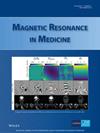Diffusion-prepared imaging with amplitude navigation for correction of motion-induced signal loss
Abstract
Purpose
Diffusion-prepared imaging is a flexible alternative to conventional spin-echo diffusion-weighted EPI that allows selection of different imaging readouts and k-space traversals, and permits control of image contrast or image artifacts. We investigate a new signal model and reconstruction for diffusion-prepared imaging that addresses signal variations caused by motion-sensitizing diffusion gradients.
Methods
A signal model, sampling theory, and reconstruction framework were developed assuming that motion-induced phases and the measured signals are random variables. The reconstruction incorporates real-valued amplitude weights estimated from low-resolution images into a linear system. A diffusion-prepared sequence was applied in phantom and in vivo acquisitions using different methods for managing phase errors from eddy currents or motion. This acquisition was performed with a high number of NEX and retrospectively undersampled to analyze errors in ADC estimation, and compared to spin-echo diffusion-weighted EPI, as well as conventional diffusion-prepared methods. The B1 sensitivity of the sequence was investigated using simulation and phantom experiments.
Results
Images reconstructed using the proposed method had similar image structures when compared to conventional spin-echo diffusion-weighted EPI, and demonstrated improved SNR efficiency compared to previous diffusion-prepared approaches. ADC errors followed a trend consistent with the derived signal model, sampling theory, and expected B1 sensitivity. The sampling requirement was shown to depend on the magnitude of motion-induced phases, as well as phases from residual eddy currents.
Conclusion
Employing amplitude weights in the reconstruction of a diffusion-prepared sequence can improve SNR efficiency at the cost of a greater minimum sampling time and increased sensitivity to B1 inhomogeneity.

 求助内容:
求助内容: 应助结果提醒方式:
应助结果提醒方式:


